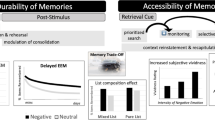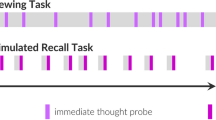Abstract
Immediate-recall tools, such as the Self-Administered Interview (SAI; Gabbert, Hope, & Fisher, 2009), have been designed to improve eyewitness performance by eliciting a comprehensive initial report. However, preliminary evidence suggests that such tools may increase psychological distress when the witnessed event is traumatic. Literature on post-traumatic stress disorder (PTSD) suggests that delaying administration of the SAI after witnessing trauma may be appropriate and may prevent harmful psychological effects. The first aim of this study was to investigate the psychological effects of delayed as opposed to immediate administration of the SAI after witnessing a traumatic event. The second aim of this study was to investigate whether this delay would then affect the SAI as a tool for improving eyewitness performance at a later stage. Eighty participants viewed a trauma-analogous video and then completed the SAI immediately, after one day, or not at all. Despite finding increases in anxiety after its completion, the SAI was not found to have an effect on PTSD symptoms at follow-up conducted one week later, irrespective of whether it was completed immediately or after a delay. On the other hand, delaying the SAI reduced memory performance and rendered it ineffective as a tool for improving memory.
Similar content being viewed by others
Notes
Pearson correlations were used to analyse inter-rater reliability because Kappa would not be appropriate given how many empty cells there could be (for example, there were over 700 responses that could have been given for the accurate non-critical items). Since most of the possible details were not recalled by most participants, the Kappa would be artificially inflated as all participants would be scoring ‘zero’ on a number of items.
References
Addolorato G, Ancona C, Capristo E, Graziosetto R, Di Rienzo L, Maurizi M, Gasbarrini G (1999) State and trait anxiety in women affected by allergic and vasomotor rhinitis. Journal of Psychosomatic Research 46(3):283–289
American Psychiatric Association. (2000). Diagnostic and statistical manual of mental disorders (4th ed., Text Revision). Washington, DC: Author.
Brewin CR (2011) The nature and significance of memory disturbance in posttraumatic stress disorder. Annual Review of Clinical Psychology 7(1):203–227
Brewin CR, Dalgleish T, Joseph S (1996) A dual representation theory of posttraumatic stress disorder. Psychological Review 103(4):670–686
Christianson S-A (1984) The relationship between induced emotional arousal and amnesia. Scandinavian Journal of Psychology 25(2):147–160
Christianson S-A (1992) Emotional stress and eyewitness memory: A critical review. Psychological Bulletin 112(2):284–309
Devilly GJ, Annab R (2008) A randomised controlled trial of group debriefing. Journal of Behavior Therapy and Experimental Psychiatry 39(1):42–56
Devilly GJ, Varker T, Hansen K, Gist R (2007) An analogue study of the effects of Psychological Debriefing on eyewitness memory. Behaviour Research and Therapy 45(6):1245–1254
Ebbesen EB, Rienick GB (1998) Retention interval and eyewitness memory for events and personal identifying attributes. Journal of Applied Psychology 83(5):745–762
Ebbinghaus, H. (1964). Memory: A contribution to experimental psychology. (H. A. Ruger & C. E. Bussenius, Trans.). New York: Dover. (Original work published 1885).
Ehlers A, Clark DM (2000) A cognitive model of posttraumatic stress disorder. Behaviour Research and Therapy 38(4):319–345
Eijkemans, H. (2011). Investigating the efficacy of the self-administered interview: Does timing of the self-administered interview affect recall performance and susceptibility to misinformation? Unpublished Master’s thesis, Maastricht University, The Netherlands.
Feldner MT, Monson CM, Friedman MJ (2007) A critical analysis of approaches to targeted PTSD prevention: Current status and theoretically derived future directions. Behaviour Modification 31(1):80–116
Foa EB, Kozak MJ (1986) Emotional processing of fear: Exposure to corrective information. Psychological Bulletin 99(1):20–35
Foa EB, Steketee G, Rothbaum BO (1989) Behavioral/cognitive conceptualizations of post-traumatic stress disorder. Behavior Therapy 20(2):155–176
Gabbert F, Hope L, Fisher RP (2009) Protecting eyewitness evidence: Examining the efficacy of a self-administered interview tool. Law and Human Behavior 33(4):298–307
Gabbert F, Hope L, Fisher RP, Jamieson K (2012) Protecting against misleading post-event information with a self-administered interview. Applied Cognitive Psychology 26(4):568–575
Gabbert F, Memon A, Allan K, Wright DB (2004) Say it to my face: Examining the effects of socially encountered misinformation. Legal and Criminological Psychology 9(2):215–227
Geiselman RE, Fisher RP, MacKinnon DP, Holland HL (1986) Enhancement of eyewitness memory with the Cognitive Interview. American Journal of Psychology 99(3):385–401
Gittins CB, Paterson HM, Sharpe L (2014) How does immediate recall of a stressful event affect psychological response to it? Journal of Behavior Therapy and Experimental Psychiatry. doi:10.1016/j.jbtep.2014.07.006
Hjelmsater ER, Stromwall LA, Granhag PA (2012) The self-administered interview: A means of improving children’s eyewitness performance? Psychology Crime & Law 18(10):897–911
Holmes EA, Bourne C (2008) Inducing and modulating intrusive emotional memories: A review of the trauma film paradigm. Acta Psychologica 127(3):553–566
Hope L, Gabbert F, Fisher RP (2011) From laboratory to the street: Capturing witness memory using the self-administered interview. Legal and Criminological Psychology 16(2):211–226
Horowitz MJ (1983) Post-traumatic stress disorders. Behavioral Sciences & the Law 1(3):9–23
Horowitz MJ (1986) Stress response syndromes, 2nd edn. Jason Aronson, Northvale, NJ
Jaycox LH, Foa EB (1996) Obstacles in implementing exposure therapy for PTSD: Case discussions and practical solutions. Clinical Psychology and Psychotherapy 3(3):176–184
Jaycox LH, Foa EB, Morral AR (1998) Influence of emotional engagement and habituation on exposure therapy for PTSD. Journal of Consulting and Clinical Psychology 66(1):185–192
Loftus EF (1975) Leading questions and the eyewitness report. Cognitive Psychology 7(4):560–572
Loftus EF (2005) Planting misinformation in the human mind: A 30-year investigation of the malleability of memory. Learning & Memory 12(4):361–366
Loftus EF, Miller DG, Burns HJ (1978) Semantic integration of verbal information into a visual memory. Journal of Experimental Psychology: Human Learning and Memory 4(1):19–31
Lovibond SH, Lovibond PF (1995) Manual for the Depression Anxiety Stress Scales, 2nd edn. Psychology Foundation, Sydney
MacLeod M (2002) Retrieval-induced forgetting in eyewitness memory: Forgetting as a consequence of remembering. Applied Cognitive Psychology 16(2):135–149
McCleery JM, Harvey AG (2004) Integration of psychological and biological approaches to trauma memory: Implications for pharmacological prevention PTSD. Journal of Traumatic Stress 17(6):485–496
McNally RJ, Bryant RA, Ehlers A (2003) Does early psychological intervention promote recovery from posttraumatic stress? Psychological Science in the Public Interest 4(2):45–79
Monds LA, Paterson HM, Kemp RI, Bryant RA (2013) Do distress responses to a traumatic film predict susceptibility to the misinformation effect? Journal of Trauma and Dissociation 14(5):562–575
Odinot G, Wolters G (2006) Repeated recall, retention interval and the accuracy-confidence relation in eyewitness memory. Applied Cognitive Psychology 20(7):973–985
Park J (2005) Effect of arousal and retention delay on memory: A meta-analysis. Psychological Reports 97(2):339–355
Paterson HM, Kemp R (2006) Comparing methods of encountering post-event information: The power of co-witness suggestion. Applied Cognitive Psychology 20(8):1083–1099
Paz-Alonso PM, Goodman GS (2008) Trauma and memory: Effects of post-event misinformation, retrieval order, and retention interval. Memory 16(1):58–75
Pitman RK (1989) Post-traumatic stress disorder, hormones, and memory. Biological Psychiatry 26(3):221–223
Rachman S (1980) Emotional processing. Behaviour Research & Therapy 18(1):51–60
Rachman S (2001) Emotional processing, with special reference to post-traumatic stress disorder. International Review of Psychiatry 13(3):164–171
Rose, S., Bisson, J., Churchill, R., & Wessely, S. (2002). Psychological debriefing for preventing post traumatic stress disorder (PTSD). Cochrane Database of Systematic Reviews, Issue 2. Oxford, England: Update Software.
Saunders J, MacLeod MD (2002) New evidence on the suggestibility of memory: The role of retrieval-induced forgetting in misinformation effects. Journal of Experimental Psychology: Applied 8(2):127–142
Shalev AY (2000) Stress management and debriefing: Historical concepts and present patterns. In: Raphael B, Wilson JP (eds) Psychological Debriefing: Theory, Practice and Evidence. Cambridge University Press, Cambridge, England, pp 17–31
Sharot T, Phelps EA (2004) How arousal modulates memory: Disentangling the effects of attention and retention. Cognitive, Affective and Behavioral Neuroscience 4(3):294–306
Shaw J, Bjork RA, Handal A (1995) Retrieval-induced forgetting in an eyewitness-memory paradigm. Psychonomic Bulletin & Review 2(2):249–253
Spielberger CD (1984) State-Trait Anxiety Inventory: A comprehensive bibliography. Consulting Psychologists Press, Palo Alto, CA
Weiss DS, Marmar CR (1997) The Impact of Event Scale—Revised. In: Wilson JP, Keane TM (eds) Assessing psychological trauma and PTSD. Guilford Press, New York, NY, pp 399–411
Wixted JT, Ebbesen EB (1991) On the form of forgetting. Psychological Science 2(6):409–415
Acknowledgements
This research was supported by two Australian Research Council Linkage Grants (LP110100220 & LP0989719).
Author information
Authors and Affiliations
Corresponding author
Rights and permissions
About this article
Cite this article
Mackay, T.L., Paterson, H.M. How does timing of recall affect eyewitness memory and psychological distress?. J Police Crim Psych 30, 242–253 (2015). https://doi.org/10.1007/s11896-014-9156-z
Published:
Issue Date:
DOI: https://doi.org/10.1007/s11896-014-9156-z




